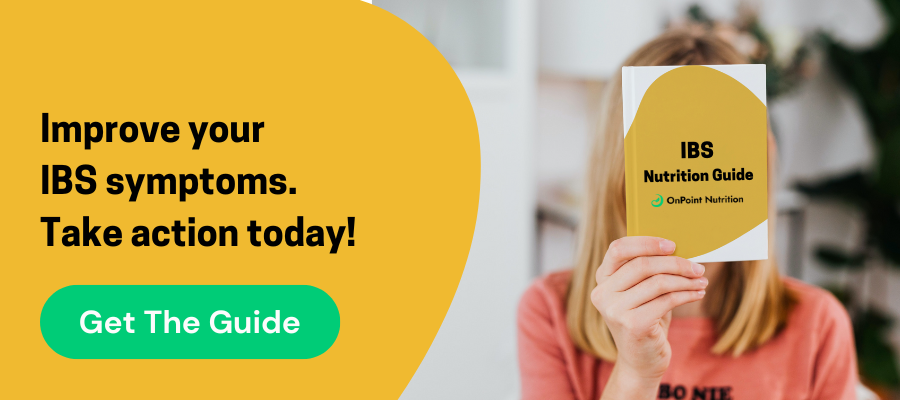If you're reading this, you probably already know the caveat: IBS symptoms and triggers are unique to each individual. However, as we advise people interested in an IBS diet, we have observed that certain foods tend to "disagree" with many people's GI tracts. Below we list the foods to avoid with IBS.
Foods to Avoid with IBS: Our Comprehensive ListRemember, don't let this list discourage you. Because each person is different, you may be able to enjoy many of the foods below. Our list is simply a sampling of foods that have triggered IBS symptoms in some individuals:
Fruits, Veggies, Dairy to Avoid for an IBS Diet
- Avoid High-gas foods such as broccoli, cauliflower, cabbage, and beans: Foods in these two veggie families contain an indigestible sugar called raffinose. Our bodies lack the enzyme to digest raffinose. However, symbiotic bacteria in the large intestine ferment raffinose, creating methane gas as a byproduct. As you may have experienced, this gas can trigger your IBS symptoms
- Avoid SOME Fresh fruit: NEWSFLASH; fruit is essential to a healthy diet. It contains many macro and micro-nutrients that are key to helping you look and feel your best. However, if you have IBS, not all fruit is created equal. Fruits that are very high in fructose can cause issues. So, foods to avoid with IBS include apples and pears, and (to an extent) avoid watermelon and concentrated fruit. Focus on eating bananas, oranges, and berries
- Minimize consumption of foods high in lactose, such as milk, ice cream, and soft cheeses, especially if lactose intolerance is suspected. Studies in China and India recently found lactose intolerance to be common in subsets of people who reported IBS. If you know you are allergic to a specific food, it becomes a very obvious food to avoid with IBS!
Fiber and IBS Diet: Finding the Right Balance
- Avoid very high fiber foods: Like with fruit, too much fiber can trigger IBS symptoms. While fiber can help alleviate constipation, certain high fiber foods may increase gas production and cause bloating. Aim for soluble (vs insoluble) fiber that adheres to a low FODMAP diet. Foods to avoid with IBS include corn and wheat bran, beans, and seeds. So what are your options? Quinoa and oats, such as oatmeal, are a great start. Other tolerable foods may include lentils and chickpeas. Remember to eat right serving size. Sometimes a "safe" food will cause issues if you simply eat too much of it!
IBS Diet and Junk Food: These are Pretty Obvious Foods to Avoid with IBS
- Avoid carbonated beverages: these drinks can lead to gas accumulation in your body. Additionally, their artificial sweetener and caffeine can cause IBS symptoms to flare up
- Chewing gum or drinking liquids through a straw. Why? Both of which can lead to swallowing air, which causes gas buildup. Chewing gum may also contain the artificial sweetener sorbitol, which is a known IBS trigger
- Avoid fried or other high-fat foods: fried foods can irritate your intestine and cause diarrhea. Think: onion rings, french fries, fried chicken fingers. Respond: avoid these foods if you have IBS.
- Avoid or minimize alcohol and caffeine intake, as both substances can stimulate the intestines and lead to diarrhea. Further, alcoholic drinks such as beer may cause bloating, which can be hard to alleviate if you have IBS. Caffeine is commonly found in tea, coffee, and some carbonated beverages. Some researchers hypothesize that caffeine rapidly speeds up the digestive process and can lead to more frequent bowel movements
- Avoid artificial sweeteners that contain sugar alcohols, such as sorbitol, mannitol, and xylitol, which may cause diarrhea. Numerous studies have connected sugar alcohols to bloating, gas, and diarrhea. These artificial sweeteners are an easy food to avoid with IBS. Instead, enjoy a small amount of real sugar!
Ethnic Food and IBS
- Avoid spicy foods: these foods can also irritate the intestine, although it depends on the person. If you don't feel well after spicy food, maybe you should ease up on the jalapeños. A recent study showed that women who regularly ate spicy food (>10 times per week) were more than twice as likely to develop IBS than those who did not
IBS Diet and Mindfulness
- Avoid large meals, which may promote cramping and/or diarrhea: This one is pretty simple. Large meals take longer and are more difficult for your body to digest. Take your time, enjoy your food with friends and family, and try not to eat while you are on-the-go
IBS and Specific Dietary Philosophies
- Avoid High-FODMAP foods: many of the foods listed above (dairy containing lactose, fruits containing fructose- apples and pears, plus the gassy veggies at the top). FODMAPs are un-absorbable carbohydrates that act as substrates for bacterial fermentation and gas production, potentially triggering GI symptoms. Check out our entire section on low FODMAP foods and how to implement a low-FODMAP routine!
- Avoid Gluten. Your doctor may recommend avoiding foods that contain gluten—a protein found in wheat, barley, and rye—to see if your IBS symptoms improve. Foods that contain gluten include most cereal, grains, and pasta, and many processed foods. Some people with IBS have more symptoms after eating gluten, even though they do not have celiac disease.
- Food sensitivities or allergies. If you have a known food allergy or sensitivity, do your best to avoid eating that time, or to enjoy it in very small quantities. If you think you may have a food sensitivity, work with your doctor and nutritionist to complete a full sensitivity test.
It may seem overwhelming to avoid certain foods. The good news is that there is a long list of tasty, satisfying foods that will satisfy your taste buds and your GI system.
To read more about foods to avoid, foods to eat, and how to make easy changes to your IBS diet to mitigate your symptoms, download our IBS Nutrition Guide.
Topics

Kaitlyn Willwerth is a Registered Dietitian at OnPoint Nutrition. Kaitlyn's work focuses on providing individualized health and lifestyle coaching and, most importantly, support. She is a Certified LEAP Therapist and has also completed the Monash University 'Low FODMAP Diet for IBS' online training course for health professionals.




